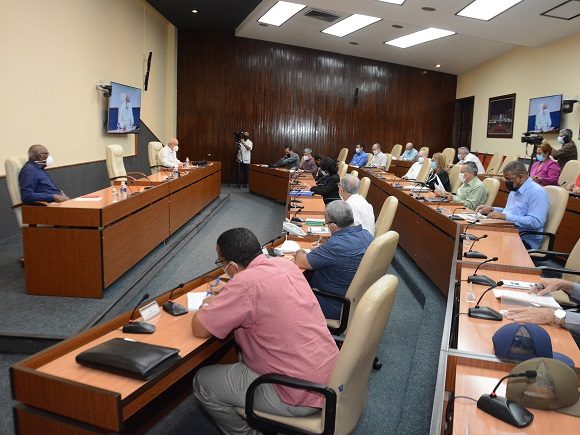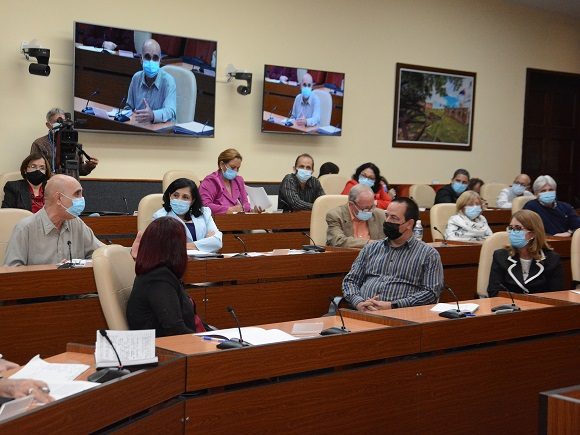Rating:
( 0 Rating )
To maintain the hygiene and safety of the population in the stage of the "new normal", minimizing the incidence of COVID-19 and also of arboviruses such as dengue, was the call for this Tuesday's meeting of the Temporary Working Group of the Government for the prevention and control of the pandemic.
With the presence of the member of the Political Bureau and Vice President of the Republic, Salvador Valdés Mesa, the meeting was held as usual in videoconference format with the main political and governmental authorities of the provinces and the special municipality of Isla de la Juventud.
The exchange was led by Vice Prime Minister Jorge Luis Tapia Fonseca, who indicated strengthening the confrontation with COVID-19 in the provinces that are reporting the highest incidence, including sending them teams of experts from the Ministry of Public Health (MINSAP) .
When analyzing the behavior of the new coronavirus epidemic, José Ángel Portal Miranda, head of MINSAP, reported that the highest transmission in November occurred in Camagüey, with 82 cases per day on average; Holguín (73) and Sancti Spíritus (58). "In these territories, 52.2 percent of those diagnosed in the country are concentrated so far in November," he stressed.

Among other issues, the Temporary Working Group paid special attention to vector control, especially dengue transmission, after analyzing the epidemiological and entomological indicators at the national level at the end of last week (number 46 of the year 2021) .
To face these risks, the MINSAP - reported Portal Miranda - is developing a group of main actions, such as increasing epidemiological surveillance at the level of health areas to identify suspected cases of arbovirus in a timely manner and ensure their admission in accordance with the indications issued.
It also prioritizes the fulfillment of the intensive anti-vector treatment actions in the 43 municipalities identified with high entomo-epidemiological risk and / or transmission of arbovirosis, for five consecutive weeks, from November 15 to December 18.
Actions include timely information through the media, raising the perception of risk in the population, and actively involving the organized community in carrying out actions to prevent and eliminate mosquito breeding sites, increasing self-awareness. responsibility with the health of each person.
Vice Prime Minister Tapia Fonseca insisted on taking advantage of the accumulated experience in vector control, with emphasis on the training of workers, many of whom are new, and the permanent evaluation of the quality of focal and adulticide work.
Also participating in the meeting were Jorge Luis Broche Lorenzo, member of the Secretariat of the Central Committee of the Communist Party, Vice Prime Ministers Inés María Chapman Waugh and Jorge Luis Perdomo Di-Lella, heads of portfolios and other government authorities.
With the experts and scientists
On Tuesday, the weekly meeting of scientists and experts who lead science and technological innovation activities in the confrontation with the new coronavirus also met. It was headed by Jorge Luis Broche Lorenzo, Inés María Chapman Waugh and Jorge Luis Perdomo Di-Lella.
Doctor of Science Raúl Guinovart Díaz, dean of the Faculty of Mathematics and Computing at the University of Havana, presented the systematic update of the COVID-19 forecasting models.
He pointed out that the provinces of Sancti Spíritus, Camagüey, Las Tunas and Holguín have the most complex situation, due to the highest incidence values and where the decrease in daily confirmed cases has stopped. However, he explained, all provinces have control of the epidemic, although it is necessary to continue applying sanitary measures rigorously.
Underlining that the forecasts are favorable for the country in all parameters, the specialist stated that the number of confirmed cases will remain below 300 daily cases until the end of November and the decline in confirmed and active cases will continue in the coming weeks.
He noted, however, that this week there is a slowdown in the decrease in the number of confirmed cases, reaching over 240 cases every day. "The virus still circulates in all regions of the country, so we must continue to be alert," he emphasized.
Another note of care was expressed by Dr. C. Pedro Más Bermejo, vice president of the Cuban Society of Hygiene and Epidemiology, when explaining the great outbreak of COVID-19 that is occurring in European countries that have already concluded the vaccination scheme and even have started the application of booster doses.
The country is prepared, the epidemiological surveillance of MINSAP "is greased", but we cannot trust ourselves, he said.
At the weekly meeting of scientists and experts who lead science and technological innovation activities in the confrontation with the new coronavirus, the VentiPAP device was also presented, a non-invasive respiratory support system, the result of collaboration between the Neurosciences and Immunoassay.The device is based on the UCL Ventura Open Source Project (from the University College of London), and is used to deal with acute respiratory failure of different etiologies.CUBADEBATE



